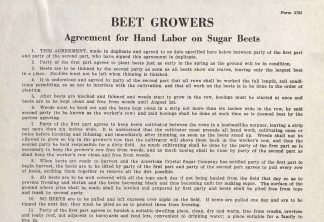By Allison Campbell-Jensen

Ellen Engseth
Archival research calls for being aware of today’s perspectives in comparison with those of past researchers. The Immigration History Research Center Archives recently digitized surveys of Mexican and Mexican-culture residents in St. Paul in the 1920s, 1930s, and 1940s. The surveys were done by what is now the International Institute of Minnesota. Founded in 1919, “it is a social service agency helping and also honoring new Americans. Activities over the years differed, depending on who the new arrivals are and what the community needs,” says Curator Ellen Engseth.
Under the archives’ normal operations, these materials were always available in the reading room, Engseth says, but now they are more accessible to a broader group. At this time, the digitization is particularly helpful during the pandemic, when so many are studying from home or doing #historyfromhome.
Putting the surveys in context
The files in the Immigration History Research Center Archives contain more than just survey results, Engseth says. The surveys are within the context of a social service agency’s working files. “You see their discussions of what questions to pose, you understand their goals with the survey,” she says.
For researchers seeking to evaluate the studies, examining the entire files can be engaging and informative. As an example, a survey’s final version can be compared with another filed behind it and labeled “File Copy” and “Preliminary — Not for Publication,” revealing the development of the final report. For students, she adds, the process of examination can really help develop their critical thinking skills. For instance, understanding the lens or bias of the author/s helps with evaluating the survey’s conclusions.
Recruited as labor
The surveys compile information from other International Institutes and also describe a pathway for migrants from southern states and Mexico to northern cities. They reveal that the people of Mexican origin were recruited by companies needing labor. In Detroit, they worked in automobile plants; in Gary, Indiana, in the steel mills. In Minnesota, in the sugar beet fields.
The files include a contract between the sugar company and their workers. It describes in detail the cultivating labor that was expected, and the living quarters to be provided. The contract describes the accommodation provided by the company as to how the worker was to keep up the living quarters — and what happened if either side didn’t meet the contract requirements. “It provides an understanding of the lived realities,” Engseth says.
The challenge of researching history
The archival materials certainly have value [for researchers] … however, “ideally, they will be paired with sources that reflect the Mexican immigrant and Mexican American experience from the perspective of community members themselves.”
—Erika Lee
It’s challenging researching the history of communities of color. Erika Lee, Professor of History and Director of the Immigration History Research Center (which is distinct from the Archives), says: “[I]t is always important to consult a wide range of sources in any kind of research and that this is especially important when studying the histories of Black, Indigenous, and people of color communities.”
The archival materials certainly have value, she adds. However, “ideally, they will be paired with sources that reflect the Mexican immigrant and Mexican American experience from the perspective of community members themselves.”
Engseth agrees — these files provide one perspective, that of local social service workers, while other historical sources will provide the experiences and perspectives of Mexican heritage Minnesotans. For example, the surveys name the newspaper read by Mexican Minnesotans as the Texas-based La Prensa, and this paper is available through the University of Texas Libraries. Many oral histories with Minnesotans of Mexican heritage and identity are online through the Minnesota Historical Society.





